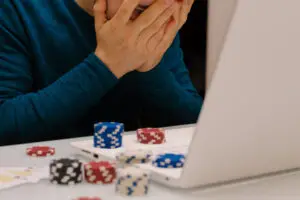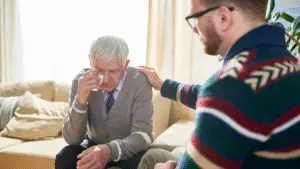When Gambling Stops Feeling Like a Game
It often begins as fun, a night out with friends, a few small bets, and the thrill of winning. But control can slip away. What used to be entertainment can become stress, secrecy, and a cycle that feels impossible to escape. Gambling addiction isn’t about willpower; it’s a behavioral pattern tied to emotions, habits, and how the brain reacts to rewards and risks.
At Bleuler Psychotherapy Center, we know how easy it is to feel stuck in that cycle and how powerful it can be to take the first step toward change. Our Gambling Addiction Therapists assist clients in understanding not just how to stop gambling but also why it became such a strong pull in the first place. We use Evidence-Based Treatment to focus on behavioral changes that support long-term recovery and emotional healing.
It’s important to note that Bleuler offers outpatient counseling for gambling addiction at our Forest Hills location and through telehealth. We do not provide inpatient or residential programs, nor do we offer detox or medical supervision on-site. When these services are needed, we refer clients to trusted external providers. Recovery starts where you are, with structured, supportive care that fits into your life.
Understanding Gambling Addiction Beyond the Surface
Gambling addiction, clinically called gambling disorder, is recognized by the American Psychiatric Association as a behavioral health condition. It involves a pattern of persistent and recurring gambling despite negative consequences.
What makes gambling addiction especially complex is that it often stems from emotional issues rather than just financial ones. The behavior becomes a way to manage mood, escape sadness, stress, or boredom, or chase the emotional “high” that comes with risk and reward.
Common behavioral and emotional patterns include:
– Chasing losses, believing another win will make things right.
– Impulsive betting, usually triggered by stress or disappointment.
– Hiding or lying about gambling habits from family or friends.
– Mood swings linked to wins or losses.
These patterns do not develop overnight; they form gradually, reinforcing themselves through the brain’s reward system. Recognizing these triggers and emotional cycles is the first step to breaking free.
The Role of Gambling Addiction Therapists in Recovery
Our therapists serve as guides and partners, helping clients understand what drives their gambling habits. The goal isn’t just to stop gambling but also to identify the emotional needs, stressors, or thoughts that fuel it.
Key goals in therapy include:
– Identifying personal triggers that lead to gambling.
– Learning healthier ways to manage stress and emotional discomfort.
– Replacing harmful habits with new, rewarding activities.
– Building awareness and resilience around urges and thoughts.
As Gambling Addiction Therapists, we prioritize insight and skill-building. We help clients draw connections between their thoughts, emotions, and actions, guiding them toward long-term behavioral changes. This process occurs in an outpatient setting, allowing clients to balance work, studies, and family life while making consistent progress in therapy.
Outpatient Counseling — Flexible Care That Fits Real Life
Bleuler Psychotherapy Center offers outpatient gambling addiction counseling exclusively, not inpatient or residential programs. Outpatient care lets individuals stay connected to their communities, using therapy as a base for real-world growth.
The benefits of outpatient treatment include:
– Applying coping skills immediately in daily life.
– Building progress gradually and sustainably.
– Maintaining privacy and flexibility.
– Balancing recovery with family, work, and personal commitments.
Our gambling addiction counseling services are available at our Forest Hills location and through secure telehealth sessions, making care accessible to people across Queens and beyond.
Outpatient therapy shows that recovery doesn’t need to mean stepping away from life. It’s about learning how to live life differently.
Behavioral Therapy: The Foundation of Gambling Recovery
Behavioral therapy is central to effective Evidence-Based Treatment for gambling addiction. This method helps clients understand and change the thought patterns and habits that keep the cycle going.
Key therapeutic approaches include:
– Cognitive Behavioral Therapy (CBT): Helps identify distorted beliefs, like “I can win it back,” and replace them with realistic, grounded thinking.
– Motivational Interviewing (MI): Boosts internal motivation to change and encourages clients to set achievable goals.
– Relapse Prevention Planning: Teaches awareness of high-risk situations and strategies to manage them before a relapse happens.
– Mindfulness-Based Techniques: Helps clients recognize emotional triggers, reducing impulsive decisions.
Each approach is practical, structured, and tailored to individual needs. Behavioral therapy helps clients understand that gambling isn’t random; it follows patterns that can be observed, understood, and changed with the right support.
How Therapists Help Clients Reshape Their Thinking
Change starts with awareness. Our therapists help clients view gambling not as something out of their control but as a learned behavior, which means it can also be unlearned.
The process often includes:
– Tracking behavior and triggers: Identifying when and why the urge to gamble occurs.
– Understanding the “reward loop”: Exploring the emotional relief or excitement that gambling provides.
– Creating healthier alternatives: Finding new activities that meet emotional needs, such as social connections, hobbies, or exercise.
– Building pause and reflection skills: Learning to respond to urges thoughtfully and make mindful decisions.
Over time, clients begin to notice changes in their thinking. The need for gambling decreases, replaced by confidence in managing emotions and making grounded choices.
Addressing the Emotional Side of Addiction
For many, gambling serves as a way to cope with deeper emotions like anxiety, guilt, loneliness, or grief. True recovery involves addressing these root issues.
In therapy, we help clients safely and compassionately explore their emotional patterns. Sessions focus on:
– Reducing shame and guilt through self-compassion.
– Repairing relationships strained by gambling.
– Addressing co-occurring issues, such as anxiety or depression.
– Rebuilding trust, both with others and with oneself.
Therapy offers space for both emotional repair and behavioral change. We remind clients that relapse or struggle is not failure; it’s a part of the learning and growth process that builds self-awareness.
Building a Support Network for Recovery
Recovery is stronger with support. Our therapists often assist clients in strengthening their support systems, both inside and outside of therapy.
This may include:
– Inviting loved ones to join parts of therapy when suitable.
– Encouraging participation in peer support groups.
– Providing referrals to external financial counseling resources when gambling-related debt adds stress.
While we do not offer financial counseling in-house, we connect clients with trusted external partners who can help navigate these practical challenges. Emotional recovery and financial stability often go hand in hand, requiring patience, structure, and accountability.
Support makes recovery more sustainable. It reassures clients that they don’t have to face this journey alone.
The Role of Telehealth in Expanding Access
Telehealth has made mental health support more accessible than ever. At Bleuler, our Gambling Addiction Therapists in Forest Hills offer therapy sessions both in-person and through secure, confidential telehealth platforms.
Telehealth sessions allow clients to receive care from home, which helps maintain consistency in therapy.
Advantages of telehealth counseling include:
– Convenience: No travel time or transportation barriers.
– Privacy: Sessions can happen in a comfortable environment.
– Consistency: Therapy can continue even when traveling or relocating.
– Accessibility: Expanded reach for individuals without access to local care.
Our telehealth services uphold the same standards of confidentiality, empathy, and professionalism as in-person sessions. They are particularly beneficial for clients balancing work, family, and recovery commitments.
Conclusion: Real Change Happens One Choice at a Time
Recovery isn’t about never feeling the urge again. It’s about learning to respond differently when the urge arises. Every pause, reflection, and healthy decision is a victory on the path to healing.
At Bleuler Psychotherapy Center, we believe that change is possible for everyone. Through outpatient therapy, compassionate guidance, and Evidence-Based Treatment, we help clients rebuild trust in themselves and regain balance in their lives.
Our Gambling Addiction Therapists in Forest Hills and through telehealth guide clients toward lasting recovery through behavioral therapy, emotional healing, and supportive care. We’re here to help you take that first step—one session, one choice, and one positive change at a time.







